Getting started with Helpdesk¶
Odoo Helpdesk is a ticketing-based customer support application. Multiple teams can be configured and managed in one dashboard, each with their own pipeline for tickets submitted by customers. Pipelines are organized in customizable stages that enable teams to track, prioritize, and solve customer issues quickly and efficiently.
Create a Helpdesk team¶
To view or modify Helpdesk teams, go to . To create a new team, click the New button in the top-left of the dashboard.
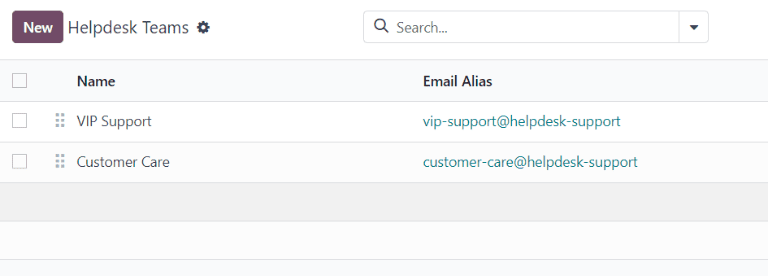
On the blank Helpdesk team form, enter a Name for the new team. Then, enter a description of the team in the field below the team name, if desired. To change the company this team is assigned to, select it from the Company drop-down menu.
Important
The team description is published on the public facing website form, where customers and portal users submit tickets. The description included in this field should not include any information that is for internal use only.
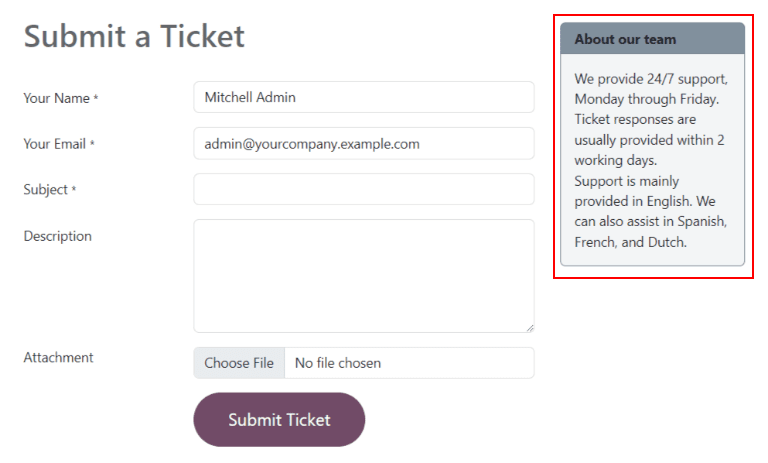
Visibility & Assignment¶
The Visibility settings alter which internal users and portal users have access to this team and its tickets. The Assignment settings alter how users are assigned to handle each ticket.
Determine team visibility¶
Under the Visibility section, select one of the following options to determine who can view this team and its tickets:
Invited internal users (private): internal users can access the team and the tickets they are following. This access can be modified on each ticket individually by adding or removing the user as a follower. Internal users are considered invited once they are added as followers to an individual ticket, or to the team itself.
All internal users (company): all internal users can access the team and all of its tickets.
Invited portal users and all internal users (public): all internal users can access the team and all of its tickets. Portal users can only access the tickets they are following.
Example
A Customer Support team, meant to handle general shipping and product issues, would have the
visibility set on Invited portal users and all internal users.
At the same time, a Financial Services team handling tickets related to accounting or tax
information would only need to be visible to Invited internal users.
Warning
A team’s visibility can be altered after the initial configuration. However, if the team changes from public access to either private or company-only access, portal users are removed as followers from both the team, and from individual tickets.
Follow all team’s tickets¶
If a user should be notified about any updates regarding tickets for this team, select their name from the Followers drop-down menu, located in the Follow All Team’s Tickets field. Multiple users can be selected to follow a single team.
Important
External contacts can be selected in the Followers field. If the team’s visibility is set to Invited internal users (private), followers are notified about updates to the team’s tickets, but are not able to view them in the portal.
Automatically assign new tickets¶
When tickets are received, they need to be assigned to a member of the team. This is done either manually on each ticket individually, or through Automatic Assignment. Check the Automatic Assignment checkbox to enable this feature for the team.
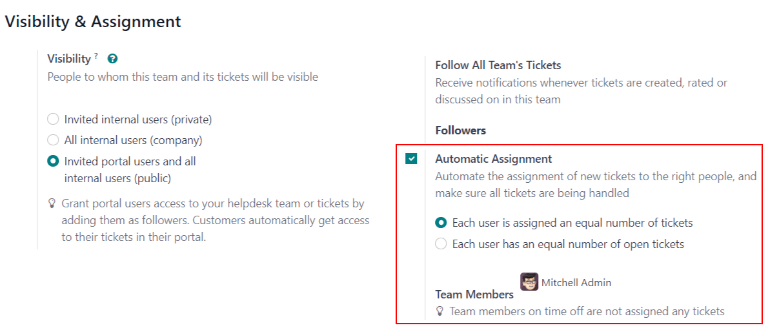
As soon as Automatic Assignment has been enabled, additional fields appear.
Select one of the following assignment methods, based on how the workload should be allocated across the team:
Each user is assigned an equal number of tickets: tickets are assigned to team members based on total ticket count, regardless of the number of open or closed tickets they are currently assigned.
Each user has an equal number of open tickets: tickets are assigned to team members based on how many open tickets they are currently assigned.
Note
When Each user is assigned an equal number of tickets is selected, the overall number of tickets assigned to team members is the same, but it does not consider the current workload.
When Each user has an equal number of open tickets is selected, it ensures a balanced workload among team members, as it takes the current number of active tickets into account.
Finally, add the Team Members who are to be assigned tickets for this team. Leave the field empty to include all employees who have the proper assignments and access rights configured in their user account settings.
Important
If an employee has time off scheduled in the Time Off application, they are not assigned tickets during that time. If no employees are available, the system looks ahead until there is a match.
See also
Create or modify stages¶
Stages are used to organize the Helpdesk pipeline and track the progress of tickets. Stages are customizable, and can be renamed to fit the needs of each team.
Important
Developer mode must be activated to access the stages menu. To activate developer mode, go to , and click Activate the developer mode.
To view or modify Helpdesk stages, go to .
The default list view on the Stages page displays the stages currently available in Helpdesk. They are listed in the order they appear in the pipeline.
To change the order of the stages, click the (six square) icon, to the left of the stage name, and drag it to the desired place on the list.
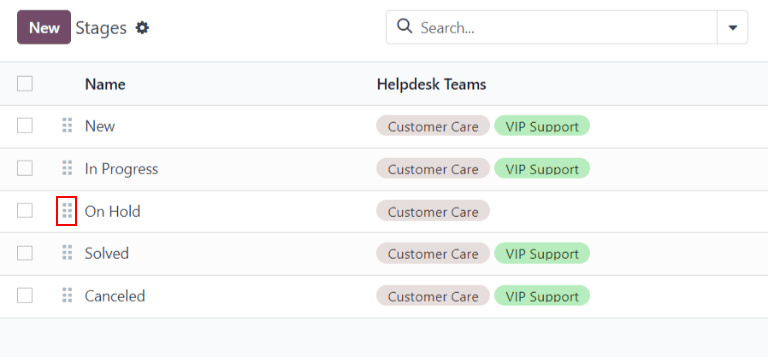
Tip
Change the stage order on the Kanban view of a Helpdesk team’s pipeline by dragging and dropping individual columns.
To create a new stage, click the New button at the top-left of the stage list. Doing so reveals a blank stage form.
Choose a Name for the new stage, and add a description, if desired. Then, proceed to fill out the remaining fields following the steps below.
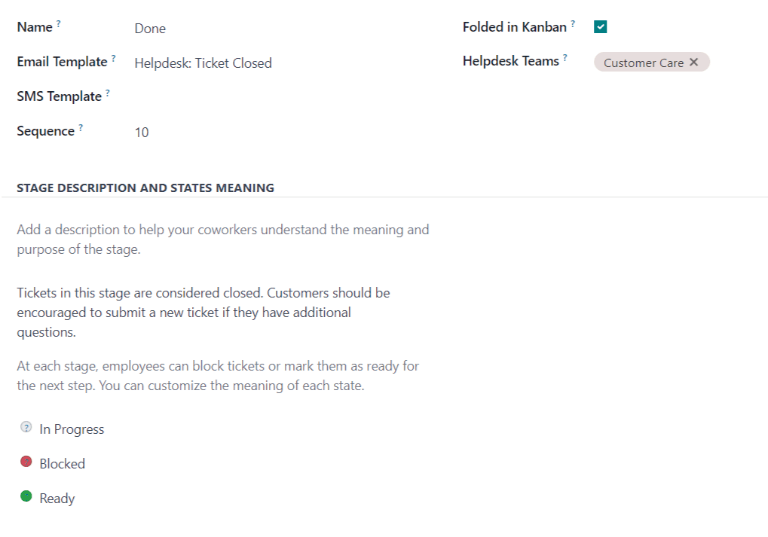
Add email and SMS templates to stages¶
When an Email Template is added to a stage, an email is automatically sent to the customer when a ticket reaches that specific stage in the pipeline. Likewise, adding an SMS Template triggers an SMS text message to send to the customer.
Important
SMS Text Messaging is an In-App Purchase (IAP) service that requires prepaid credits to work. Refer to SMS Pricing FAQ for additional information.
To select an existing email template, select it from the Email Template field. Click on the → (Internal Link) icon to the right of the field to edit the chosen template.
To create a new template, click the field, and enter a title for the new template. Then, select Create and edit from the drop-down menu that appears, and complete the form details.
Follow the same steps to select, edit, or create an SMS Template.
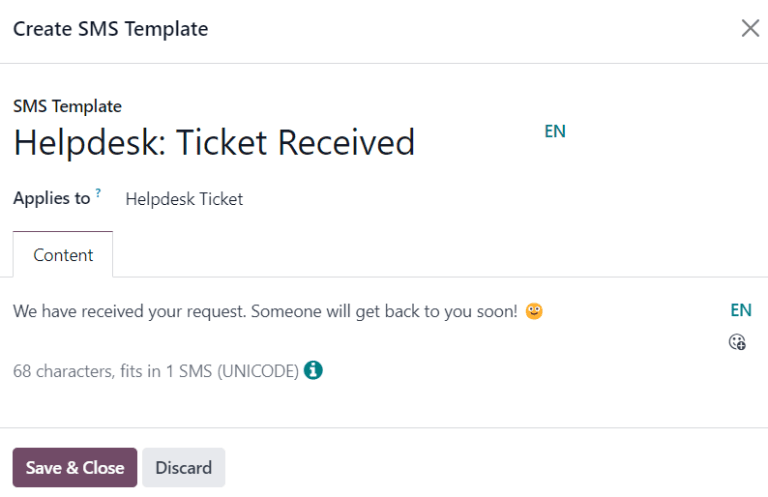
See also
Assign stages to a team¶
Make a selection in the Helpdesk Teams field on the Stages form. More than one team may be selected, since the same stage can be assigned to multiple teams.
Fold a stage¶
By default, stages are unfolded in the Kanban view of either tickets dashboard: My Tickets () or All Tickets ().
Tickets in an unfolded stage are visible in the pipeline under the stage name, and are considered open.
Stages can be configured to be folded in the Kanban view of a tickets page (My Tickets or All Tickets).
The name of the folded stages are still visible, though the tickets in the stage are no longer immediately visible.
To fold a stage, check the Folded in Kanban box on the Stages form.
Warning
Tickets that reach a folded stage are considered closed. Closing a ticket before the work is completed can result in reporting and communication issues. This setting should only be enabled for stages that are considered closing stages.
Stages can be temporarily folded in the Kanban view of the tickets pipeline, as well.
View a specific team’s pipeline by navigating to , and clicking the team’s Kanban card.
Select a stage to fold temporarily, then click the ⚙️ (gear) icon, and select Fold.
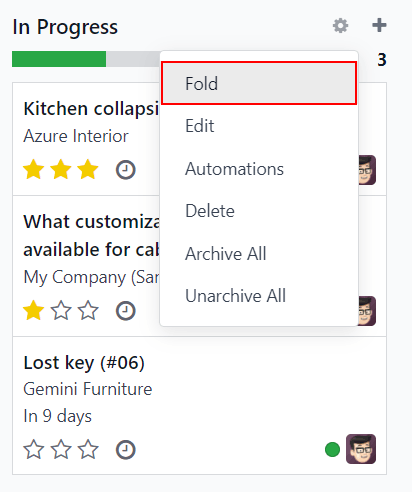
Important
Manually folding a stage from the Kanban view is temporary and does not close the tickets in the stage.